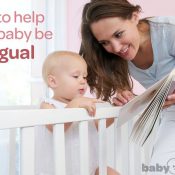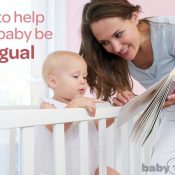
WHY IT’S IMPORTANT FOR YOUR CHILD TO LAUGH
Laughter, whether it be a delicate titter or a tummy rumbling guffaw, is a major milestone for your baby and can offer reassurance that your child is developing critical emotional and social capabilities. Generally, the first laugh occurs around the 3-4 month mark. However, these laughs may not necessarily be due to a full understanding of the situation. He or she has just stumbled upon a novel sound for them and will soon want to continuously make it regardless of whether or not something is actually funny. This raises questions though, such as when do babies fully understand jokes and when is the ability to make jokes gained?
Shared humorous interactions between you and your tot are the perfect tool for building secure attachments. Among adults, there is a lot of literature linking humor to increased intimacy, emotional attachment, and greater trust.[1],[2],[3] The corresponding literature for infant humor is small, but there are indications that infants are eager to laugh and form connections through laughter. Studies have suggested that attachments may be related to how often a baby laughs and that humor can have influences upon a baby’s temperamental qualities.[4] A 2001 study conducted by Vasudevi Reddy found that 8 month old infants would join in on the laughter of those around them despite not actually being involved in the conversation. This implicates them as active listeners and who eager to join in on the fun.
Babies also strive to make you laugh as well. It may not necessarily be clever or witty by our standards, but they quickly get better. It was found that most infants were reported to make others laugh through repeating actions that had elicited laughs from others previously.[5] However, over time your little one’s humor will become more refined through picking up on techniques that adults use to make others laugh. The perception of humour does not arise until 18 months when children are able to engage in symbolic play — the ability to use objects, actions, or ideas to represent other objects, actions, or ideas as play.[6],[7]
Laughter is not only part of their emotional and social development, but also part of their intellectual development. Humor is essentially an intellectual playtime for children to explore emotions and social interactions through a variety of tactics. Whether it be wordplay or making an absurd face, babies are gradually gaining a better understanding of the world by engaging in more abstract thinking through symbolic play.
While laughter may not necessarily seem like a behavior that is as important to watch out for as speaking or walking, laughter is as indicative of development as are gaining creativity, social skills, emotional skills, and intellectual skills.
REFERENCES
[1] Hampes, William P. “Relation Between Intimacy And Humor.” Psychological Reports 71.1 (1992): 127-30. Web.
[2] Hampes, William P. “The Relationship Between Humor and Trust.” Humor, 1999. Web.
[3] Hampes, William P. “The Relationship between Humor and Trust.” Humor – International Journal of Humor Research 12.3 (2001): n. pag. Web.
[4] Mireault, Gina, John Sparrow, Merlin Poutre, Brittany Perdue, and Laura Macke. “Infant Humor Perception from 3- to 6-months and Attachment at One Year.” Infant Behavior and Development 35.4 (2012): 797-802. Web.
[5] Reddy, Vasudevi. “Infant Clowns: The Interpersonal Creation of Humour in Infancy.” Enfance 53.3 (2001): 247. Web.
[6] Shultz, T.R. “ A Cognitive Developmental Analysis of Humor. In A.J. Chapman and H.C. Foot (eds.), Humor and Laughter: Theory, Research, and Applications. London: John Wiley & Sons.
[7] McGhee, P. “Development of the Sense of Humor in Childhood: A Longitudinal Study.” In P.E. McGhee & A.J. Chapman (Eds). Children’s Humor (pp.213-236). New York: John Wiley.



